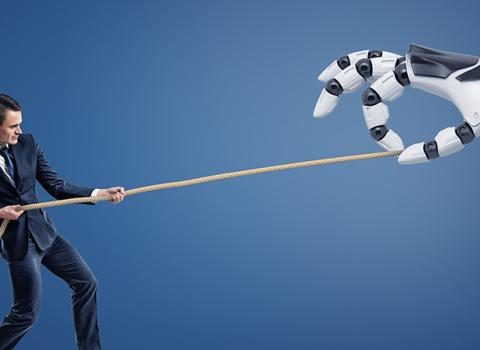
Aibo, the robo-dog.
Aldebaran Robotics and K-Team will be the first robots makers to embed
the software, and further licensing opportunities are available. The
company is also looking for investment from venture capital.
Founded with seed money by Jean-Christophe Baillie and with only 10 employees, Gostai has an ambitious aim: to equip robots with what was key for the success of the PC back in the 1980s: a common and universal IT platform.
“At the last Aichi exhibition, there were more than a hundred robots demonstrated,” explains an enthusiastic Baillie. Since the beginning of the year, about one new personal robot has been launched every week. And giant corporations like Microsoft are starting to pour money in the field.
The problem, according to Baillie is “each new robot has its own operating system and proprietary programming language”. Up to now, this specificity has slowed the take up of personal robots or robots for the house such as vacuum cleaners, maulers and smart toys. Robots were simply incompatible with each other.
Things changed when Baillie and his team at ENSTA, which is part of the ParisTech groups of institutes, released URBI, or Universal Real-time Behavior Interface, a scripted language designed to to make robot programming easy and to work over a client/server architecture.
URBI is both a low-level command language with which motors and sensors are directly read and set, and at the same time, it allows to developers to script complex commands, to execute different commands simultaneously and to make them event driven. Programmers can write new functions and plug in objects in C++, Java or Matlab onto various operating systems like Windows, Mac or Linux.
The interoperability and simplicity of this programming tool have already convinced about 20 universities worldwide to develop robotic command programs with it. Baillie has released a free version of URBI for Aibo (Sony’s much-publicised robo-dog) that is gathering a community of developers. He has also created urbiforge.com as a platform for developers to exchange scripts.
Baillie intends now to license URBI 1.0 as a kind of Windows for personal robots. Aldebaran Robotics, the developer of NAO, the first French android, and Swiss robot manufacturer K-Team have already adopted URBI. Gostai is also currently in discussions with Japanese and Korean manufacturers.




 A unique international forum for public research organisations and companies to connect their external engagement with strategic interests around their R&D system.
A unique international forum for public research organisations and companies to connect their external engagement with strategic interests around their R&D system.